 Petzlover
Petzlover Boerboel is originated from South Africa but Pudelpointer is originated from Germany. Both Boerboel and Pudelpointer are having almost same height. Boerboel may weigh 60 kg / 133 pounds more than Pudelpointer. Both Boerboel and Pudelpointer has almost same life span. Both Boerboel and Pudelpointer has almost same litter size. Both Boerboel and Pudelpointer requires Low Maintenance.
Boerboel is originated from South Africa but Pudelpointer is originated from Germany. Both Boerboel and Pudelpointer are having almost same height. Boerboel may weigh 60 kg / 133 pounds more than Pudelpointer. Both Boerboel and Pudelpointer has almost same life span. Both Boerboel and Pudelpointer has almost same litter size. Both Boerboel and Pudelpointer requires Low Maintenance.
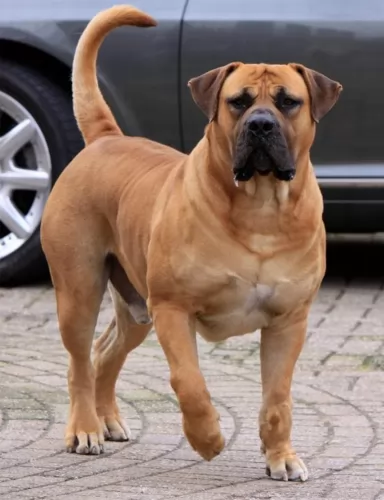 The name ‘Boerboel’ is derived from an Afrikaans/Dutch word, and the large Boerboel dog from South Africa has been specifically bred to be a farmer’s dog. Bred also to be a strong guard dog, the Boerboel is a mix of different African and European breeds, which in all likelihood, will include the Bullmastiff, the Rhodesian Ridgeback and the Bulldog. These dogs were used to hunt baboon and leopard.
The name ‘Boerboel’ is derived from an Afrikaans/Dutch word, and the large Boerboel dog from South Africa has been specifically bred to be a farmer’s dog. Bred also to be a strong guard dog, the Boerboel is a mix of different African and European breeds, which in all likelihood, will include the Bullmastiff, the Rhodesian Ridgeback and the Bulldog. These dogs were used to hunt baboon and leopard.
There is some information that suggests that the Boerboel was brought to South Africa by Jan van Riebeeck in 1652. Other information suggest that the dog is a descendant of the old Boer Hund, a powerful animal which was invaluable to the farmer.
In was in January 2010, that the American Boerboel Club was elected as the AKC’s Parent Club. The Boerboel was accepted into the Miscellaneous Class in the Working dog group.
 The Pudelpointer is cross between the Poodle and the English Pointer. The first Pudelpointer was bred in 1881 by Baron Von Zedlitz in Germany.
The Pudelpointer is cross between the Poodle and the English Pointer. The first Pudelpointer was bred in 1881 by Baron Von Zedlitz in Germany.
The idea was to bring about a gun dog highly skilled in tracking and retrieving. The Pudelpointer was introduced to North America in 1956, and in 1977 the Pudelpointer Club of North America was established.
Because breeders have avoided recognition by the American Kennel Club, the Pudelpointer never became a well known breed in the United States.
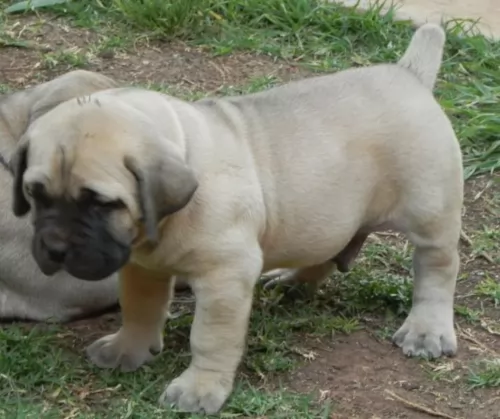 The Boerboel is a big, strong dog with powerful muscles. His height is between 61 – 66cm. He is similar looking to the Boxer dog, just heavier and bigger. The head of the dog is broad and big and the short, smooth coat can be of various shades, with breeders trying to achieve a single color of light tan and with no white. Their coats can also be red, different shades of brown and brindle.
The Boerboel is a big, strong dog with powerful muscles. His height is between 61 – 66cm. He is similar looking to the Boxer dog, just heavier and bigger. The head of the dog is broad and big and the short, smooth coat can be of various shades, with breeders trying to achieve a single color of light tan and with no white. Their coats can also be red, different shades of brown and brindle.
The dog has a black facial mask and the eyes are brown with the ears being of medium length and floppy. The Boerboel’s tail has always been docked, but today breeders are keeping the tail long. Many Boerboel lovers object to this, saying it detracts from the distinctive look of the Boerboel.
The Boerboel can be a wonderfully loyal and loving pet to their owners. They are territorial dogs and suspicious of strangers. This is a dog where it is imperative that they receive training and socialization as a puppy. They have leanings towards being aggressive so they wouldn’t be recommended to first time dog owners, unless of course the first time owners are firm and strong.
Boerboels raised the right way can be gentle giants. They often get bad publicity as regards to aggression, but this is because of they way they have been raised. Boerboels have been bred to be tough and fearless and they make excellent watchdogs. When raised and trained correctly, they make awesome, devoted companions, even around children and other pets.
 The Pudelpointer stands at between 55 and 68cm in height and weighs between 20 and 30kg. He is a medium sized dog with a weather resistant, double-layered coat. The coat doesn’t shed much and is usually a brown, chestnut, liver or black color.
The Pudelpointer stands at between 55 and 68cm in height and weighs between 20 and 30kg. He is a medium sized dog with a weather resistant, double-layered coat. The coat doesn’t shed much and is usually a brown, chestnut, liver or black color.
The coat is usually dense, harsh and wiry. They have floppy ears with quite a unique feature - the mustache on the muzzle. The tail is docked, with about 30% being removed, giving the dog an attractive, distinctive look.
Full of energy, the lively Pudelpointer will love to find himself in a family where they are active, outdoorsy types. He loves water too, and when out on a hike, if there’s water around, he’ll be the first to jump right in.
He’s an intelligent dog too, eager to please and ready to learn. He can easily be trained and socialized. He is loyal, calm and loving and will get on well around children and other animals in the home. He is also protective and makes a good watchdog.
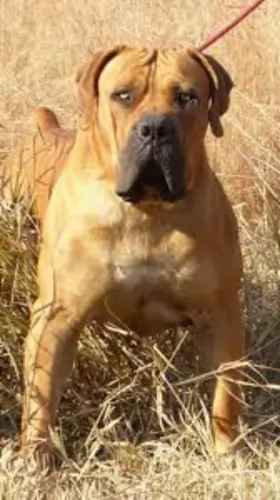 A well trained, socialized Boerboel makes a splendid pet. This is one breed known to have excellent guard- and watch dog characteristics. Boerboels are known for being protective when necessary. When not on guard, they make wonderful pets. He’ll need plenty of exercise, but he loves to also spend time indoors with his human family.
A well trained, socialized Boerboel makes a splendid pet. This is one breed known to have excellent guard- and watch dog characteristics. Boerboels are known for being protective when necessary. When not on guard, they make wonderful pets. He’ll need plenty of exercise, but he loves to also spend time indoors with his human family.
This a a bold, fearless dog who becomes devoted to his family. With the right training he is obedient and affectionate and knows how to behave appropriately indoors- and outdoors. For such a big dog, the African Boeboel’s temperament can be surprisingly gentle and affectionate around the family that he loves.
 The Pudelpointer may well be a gun dog but when it comes to his human family he is a social, loving companion.
The Pudelpointer may well be a gun dog but when it comes to his human family he is a social, loving companion.
He is intelligent too and can be easily trained. When at home with his human family, he is calm and content. He will however need lots of exercise and mental stimulation. In exchange for your love and care, he will be a good watchdog, protector, pet and friend.
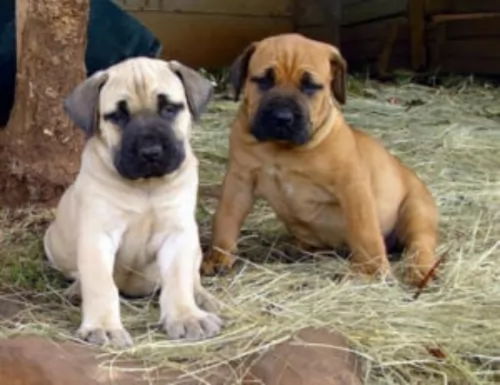 Many health problems experienced with any dog are found in the way dogs are fed, the way they are exercised and the way they are attended to when they are ill. Boerboels are healthy dogs and suffer fewer health defects than most similar breeds. The average life expectancy of a Boerboel is about 10 to 12 years. There are one or two health issues you’ll want to watch out for with your Boerboel.
Many health problems experienced with any dog are found in the way dogs are fed, the way they are exercised and the way they are attended to when they are ill. Boerboels are healthy dogs and suffer fewer health defects than most similar breeds. The average life expectancy of a Boerboel is about 10 to 12 years. There are one or two health issues you’ll want to watch out for with your Boerboel.
This aliment is typically found in large breed dogs. It’s a problem caused by a malformation of the hip joint. Over time hip dysplasia causes discomfort, pain and even arthritis and lameness. It is genetically inherited, with its severity being influenced by environmental factors. There are treatments available to alleviate the symptoms and make the dog more comfortable.
The Boerboel has plenty of muscle mass, and because he is such a large dog with a big appetite, he can lean towards obesity. Plenty of activities will be imperative to maintain muscle mass and ward off obesity. Over-eating suppresses the immune system, so over-feeding your dog simply contributes to ill health.
 The Pudelpointer is active and healthy and can live up to 14 years and maybe even longer with good care.
The Pudelpointer is active and healthy and can live up to 14 years and maybe even longer with good care.
Owners will do well to know about a couple of the common dog illnesses that can strike at any time -
Some dogs are more at risk for bloating. Larger dogs with deep chests are at greater risk. To help with preventing this deadly ailment, feed your dog a couple of smaller meals a day instead of one big meal that he gobbles up quickly.
Bloat is a medical condition which comes about with a rapid accumulation of gas in the stomach. Canine bloat or gastric dilatation and volvulus is a killer disease. The accumulation of gas can cause the stomach to twist and the dog can go into shock.
Your dog will be trying to vomit, he’ll be panting and pacing, drooling with a hard, swollen stomach.
This is a common illness or condition seen in many dogs, young and old, large and small.It’s a disease which can lead to pain, arthritis and lameness.
The Pudelpointer has floppy ears and loves swimming. The floppy ears are at risk for developing ear infections. Check inside the ears that they aren’t red or have a discharge. Your dog will be scratching his ears a lot.
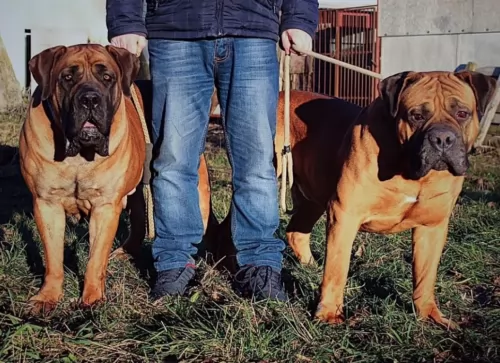 Boerboels are a robust breed and their short hair doesn’t shed heavily. Your Boerbul will require a thorough brushing twice a week to remove loose hair and to keep the coat shiny and healthy.
Boerboels are a robust breed and their short hair doesn’t shed heavily. Your Boerbul will require a thorough brushing twice a week to remove loose hair and to keep the coat shiny and healthy.
Boerboels, just like any other dog, should have their teeth brushed regularly to prevent tartar and plaque build-up. Left unattended, your pet can battle with tooth decay and gum disease.
Your Boerboel puppy will need ‘large breed puppy’ dog food. Speak to your veterinarian about wet- or dry kibble choices. An adult Boerboel will certainly need raw meat in his diet. When you do research, you find that the best Boerboel breeders are advocates for raw feeding. Home made food with rice, vegetables and meat as well as the best quality commercially manufactured dog foods for large breeds are excellent choices but raw meat is imperative as part of every dog’s diet.
 Brush your PudelPointer twice a week to get rid of loose hairs.
Brush your PudelPointer twice a week to get rid of loose hairs.
Grooming can be an awesome bonding experience for you and your dog. While you’re brushing him, check him over for any unusual lumps.
Trim the nails if they don’t wear down naturally themselves.
Check inside the mouth for rotting teeth which can be a source of pain and lot of diseases in the body.
Exercise is very important and can come in the form of a walk every day or hikes, swimming as well as ball- and rope games and hide-and-seek.
Provide your dog with a nice warm, comfortable place to sleep.
Your PudelPointer can get to 14 years of age with good food. While you do get some excellent commercially manufactured dog foods, you want to be sure your pet gets some nutritious home-made food too.
Make sure that the kibble is the high quality ones with lots of vitamins and minerals. Boiled chicken, brown rice or pasta and spinach, sweet potatoes and carrots are a healthy choice for your pet – plain and simply just like dogs love it. Chop it up and add it into the dry kibble a couple of times a week.
Some raw meat added in from time to time will help his skin and coat remain healthy. Never leave him without a constant source of fresh, cool water.